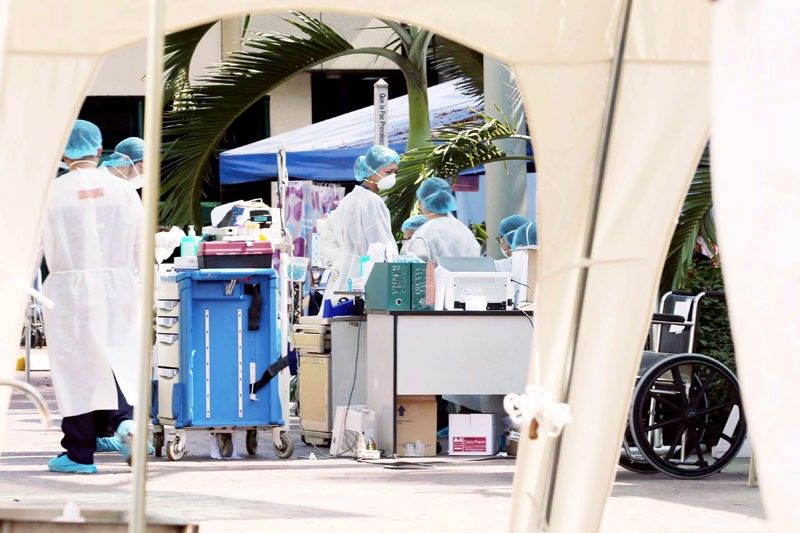Hospitals send SOS PGH, Caloocan hospital to get COVID cases

MANILA, Philippines — At The Medical City in Pasig, about 140 doctors and nurses are now on quarantine, with some doctors on respirators, after being exposed to coronavirus disease 2019 (COVID-19) patients.
In a joint statement yesterday, 11 hospitals and medical centers warned that the healthcare system could crash due to a continued increase in the number of COVID-19 cases, which is depleting their workforce.
“This unprecedented and escalating medical crisis cuts across borders. If we do not put our acts together, the prospect of the healthcare delivery systems crashing down is imminent and real. It is already happening,” they said.
They described as “alarming” the number of nurses, resident physicians, consultants and hospital employees who are undergoing 14-day quarantine due to COVID-19 exposure, and recommended that the government “centralize all efforts and resources into one or two COVID-19 hospitals, adequately equipped and invested upon by the government.”
“We speak, as one, because the mismatch between the exponential surge of patients and the available healthcare workers is no longer occurring in just one center, but in all our respective institutions. We share information and coping mechanism, but we cannot share resources that we no longer have,” the group stressed.
Apparently in response, Health Secretary Francisco Duque III said yesterday that the Philippine General Hospital (PGH) in Manila and the Dr. Jose N. Rodriguez Memorial Hospital and Sanitarium in Caloocan City have been designated as COVID-19-dedicated health facilities.
Duque said PGH director Gerardo Lopez has offered the exclusive use of one building for 140 cases.
The Jose Rodriguez sanitarium, previously known as the Tala Leprosarium and operated by the Department of Health (DOH), will serve as a “specialized hospital” for COVID-19 patients.
“We will expand to other hospitals (in the regions) after assessment of effectiveness of the two initial COVID-19 centers, which we hope can be operational next midweek,” Duque said in an interview.
He said they initially planned to use the Lung Center of the Philippines (LCP) in Quezon City as a COVID-19 center, but could not yet do so as the hospital has many lung cancer patients.
The 11 signatories to the joint statement are the Adventist Medical Center, Medical Center Manila, Asian Hospital Medical Center, Our Lady of Lourdes Hospital, Cardinal Santos Medical Center, The Medical City, Fatima University Medical Center, St. Luke’s Medical Center, Makati Medical Center, University of the East Ramon Magsaysay Medical Center and Manila Doctors Hospital.
Their statement was endorsed by the Philippine College of Physicians and Philippine College of Surgeons.
Based on DOH records, the 11 hospitals are handling 106 out of the 217 confirmed COVID-19 cases or 48.8 percent as of March 26.
The Medical City president and chief executive officer Eugene Ramos, in interviews with TV 5 and dzMM yesterday, expressed concern over what would happen if the need for confinement in the hospital’s intensive care unit would spike.
“Actually, we can no longer cope. Actually, we’re overloaded,” Ramos said, even as he gave assurance that “we’re not going to shy away from our responsibilities.”
Unverified reports circulating on Viber asked for prayers for the quick recovery of at least seven doctors on the frontlines in the fight against the pandemic, confined in various hospitals in the capital region and some of them intubated in intensive care.
Delayed test results
Ramos said exposure of health workers has been aggravated by the slow release of COVID-19 test results. From the previous wait of 48 hours, it now takes from four to five days for results to be known, by which time an infected person would have already spread the virus.
He expressed alarm over the rapid deterioration of COVID-19 patients, with poor oxygenation occurring within three to six hours after checking into a hospital.
Health Undersecretary Ma. Rosario Vergeire admitted the delay in the release of COVID-19 test results.
“Totoo po iyon (That’s true),” she said in an interview. “We are being challenged right now with our testing capability.”
She said the DOH hopes to set up other COVID-dedicated hospitals in other strategic areas across the country.
Ramos expressed concern over the crowding at quarantine checkpoints set up around Metro Manila, wherein social distancing could not be observed.
“You can be sure, in a couple of days, there will be a surge (in COVID-19 cases),” he told dzMM.
Duque assured the public that there would be careful planning with respect to the use of the Lung Center, as the hospital committed to earmark 40 rooms for COVID-19 cases.
He also announced that the Philippine Blood Center (PBC) would focus on blood donations to ensure an adequate supply of blood for severe and critical patients.
13 new cases, 1 death
As of yesterday, the number of COVID-19 cases in the country stood at 230 after 13 new cases were recorded. The death toll also rose to 18 while those who recovered remained at eight.
Vergeire said a 65-year-old Filipino from Quezon City who had traveled to Singapore was the latest fatality.
With the arrival of more testing kits, she assured the public that the country’s testing capability would be boosted. She admitted a backlog in the testing done at the Research Institute for Tropical Medicine in Muntinlupa, which is saddled with a continuing increase in requests for COVID-19 tests.
Senate committee on health and demography chair Bong Go said yesterday it is important to identify and capacitate select hospitals that can exclusively handle COVID-19 cases in order to have a more unified approach, maximize limited resources, protect health workers and avoid exposure of patients in hospitals with non-COVID-19 health concerns.
“By designating specific hospitals, it is easier for the government to monitor the progress of the patients and in positioning logistics and other resources. It also lessens possible exposure of COVID-19 positive patients to other non-infected individuals in hospitals,” Go explained.
Go said this approach will also avoid unnecessary exposure of health frontliners in other hospitals to COVID-19. He further explained that health professionals working in hospitals that are not one of those designated to specialize in novel coronavirus cases can focus on treating other patients who are facing non-COVID-19 but equally high-risk diseases and conditions.a
- Latest
- Trending
































